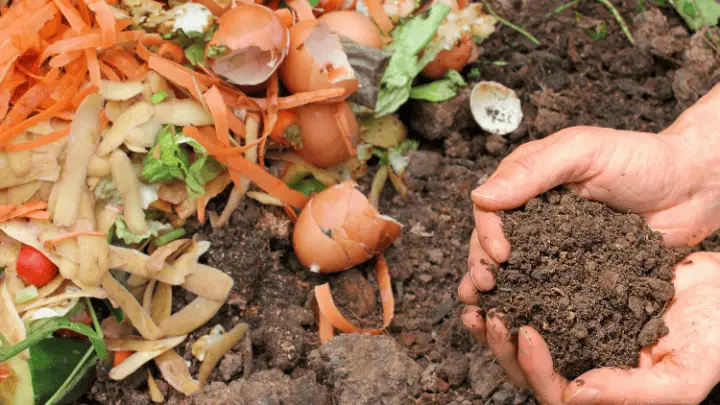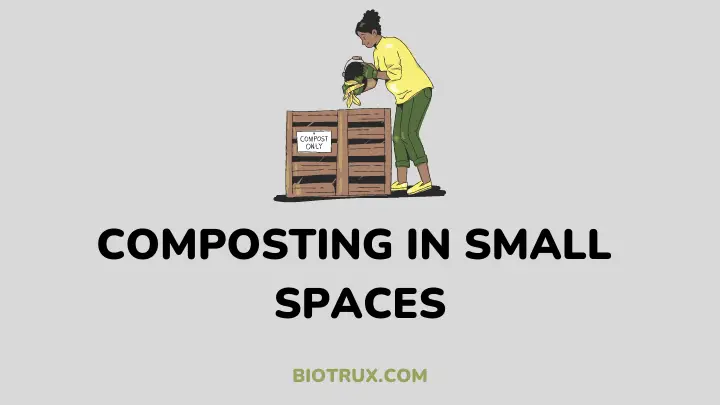Composting is a fantastic way to reduce waste and create nutrient-rich soil for your plants. But what if you don’t have a large backyard or outdoor space to compost? Don’t worry – composting in small spaces is still possible.
Whether you live in an apartment or have limited outdoor space, composting is still possible and can benefit your plants and the environment. But with so many methods and challenges to consider, it can feel overwhelming.
In this article, you’ll explore the benefits and challenges of composting and find suitable methods for those with limited space. Plus, I’ve got some handy tips to help you get started and make the most out of your composting efforts.
So, whether you’re a seasoned gardener or just starting, let’s dive into composting. You’ll discover how to turn your kitchen scraps into nutrient-rich soil for your plants.
Ready? Let’s go.
Understanding Composting in Small Spaces
Composting is a sustainable and eco-friendly way to reduce waste and create nutrient-rich soil for your garden. Even if you live in a small space, like an apartment or a townhouse with a limited outdoor area, you can still enjoy the benefits of composting.
The benefits of composting in small spaces
Let’s explore the myriad benefits of composting in small spaces that go beyond waste management.
- Reduced environmental footprint: Composting reduces the amount of organic waste sent to landfills and dumps, minimizing methane emissions and lowering environmental impact.
- Nutrient-rich soil: The compost can enrich the soil in container gardens or small plots, promoting healthy plant growth and higher yields.
- Cost savings: Composting saves money on fertilizers and soil conditioners, making it a cost-effective way to nurture your plants.
- Sustainable living: Composting aligns with sustainable living practices, fostering a deeper connection with nature and the environment.
Challenges of composting in small spaces
- Limited space: Small apartments or houses without outdoor space can make accommodating compost bins or piles difficult.
- Odor control: Composting can sometimes produce unpleasant odors, especially in small spaces. The smell can become overwhelming and unpleasant for those living nearby without proper ventilation or airflow.
- Pest control: Keeping pests away from the composting materials can be challenging in compact spaces. Flies, rodents, and other critters are attracted to organic waste, making it necessary to find effective methods to keep them out.
- Limited compost output: Composting in a small space may restrict the amount of organic waste that can be composted.
Choosing a Suitable Composting Method For Small Spaces
Not all composting methods are created equal. To maximize the benefits of composting, choosing the right method that suits your needs and lifestyle is important.
1. Traditional backyard composting pile
This method involves collecting organic materials such as food waste, yard waste, and paper products, allowing them to decompose naturally over time. This method requires regular turning and maintenance to ensure proper decomposition and prevent unpleasant odors.
2. Vermicomposting
Vermicomposting involves using worms like red wigglers to break down organic matter. This method is ideal for those with limited outdoor space, as it can be done indoors using a worm bin.
It is a low-maintenance method that produces nutrient-rich worm castings, also known as vermicast, that can be used as a soil amendment.
3. Bokashi composting
For those living in urban areas or with limited space, bokashi composting may be the right choice. Bokashi composting is a fermentation process that uses a specialized bran mixture to break down organic waste.
It can be done indoors and doesn’t produce unpleasant odors. Once fermented, the waste can be buried in the soil or added to an outdoor compost pile.
4. Composting in smart pots or grow bags
If your outdoor area is limited, you may want to use smart pots or grow bags for composting. These fabric containers have excellent aeration and drainage, making them ideal for composting on a smaller scale.
5. Tumbling composters
Tumbling composters are designed to speed up the composting process, and they are available in various sizes suitable for small spaces.
These containers can be rotated to mix the composting materials effectively. Tumblers are often compact and fit well in small outdoor spaces like balconies or patios.
Tips for Composting in Small Spaces
1. Evaluate the space limitations and available options
When composting in small spaces, it’s important to evaluate the limitations of your space and consider the available options for composting. Look at the size of your space and determine how much compost you can realistically manage.
Consider if you have enough room for a traditional compost bin or if you need to explore alternatives such as vermicomposting or a compost tumbler. Evaluating your space limitations and exploring options will help you find the best composting solution for your small space.
2. Balance green and brown materials effectively
Green materials like fruit scraps and grass clippings provide nitrogen, while brown materials like dried leaves and shredded paper provide carbon.
You can create a healthy and balanced compost pile by alternating layers of green and brown materials. This not only helps in breaking down the organic matter efficiently but also reduces any unpleasant odors.
3. Layer organic materials for optimal composting
Composting in small spaces can be challenging, but it is still possible to create nutrient-rich compost. One tip for maximizing the efficiency of your composting process is to layer organic materials.
You can create a well-balanced mix of carbon and nitrogen by layering different types of organic matter, such as kitchen scraps, yard waste, and leaves. This balance is crucial for decomposition and will result in faster composting.
Additionally, layering helps prevent odors and pests, making it an effective technique for small-space composting.
4. Have a plan to manage composting odors
Composting in small spaces can be a challenge, especially when managing odors. One of the key tips for successful composting in limited areas is to have a plan in place to control and minimize odors.
The compost pile can be covered using odor-absorbing materials, such as shredded newspaper or dried leaves. Additionally, regular turning and mixing of the compost can help to aerate it and reduce odors.
It’s important to address odor management early to ensure a pleasant and efficient composting experience.
5. Be patient and give compost enough time to mature
When composting in small spaces, it’s important to be patient and give your compost enough time to mature. Composting is a natural process that takes time, and rushing it can lead to poor-quality compost.
Allow the organic matter to break down and decompose properly before using it in your garden or on your plants. This patience will ensure you have high-quality compost that will enrich your soil and help your plants thrive. Remember, good things come to those who wait.
What to Compost and What to Avoid

Composting in small spaces necessitates being selective about what you add to the compost pile. Here’s a list of what to compost and what to avoid:
Things to Compost:
- Fruit and vegetable scraps
- Coffee grounds and filters
- Eggshells
- Tea bags
- Shredded paper and cardboard
- Dry leaves
- Plant-based kitchen waste
Things to Avoid Composting:
- Meat, fish, and dairy products
- Greasy or oily foods
- Diseased plant material
- Pet waste
- Invasive weeds
FAQs
Can you compost in an apartment with no outdoor space?
Yes, you can. Consider using vermicomposting or a Bokashi composting system indoors.
How do you know if your compost is ready to use?
Compost is ready when it turns dark, crumbly, and earthy-smelling. This process can take weeks to months, depending on the method and materials used.
Can you compost in freezing temperatures?
Composting can continue in freezing temperatures, but the process may slow down. Insulate the compost pile or bin to retain heat and speed up decomposition.
Is composting difficult to manage?
Composting is relatively easy, but it requires some attention to maintain the right conditions for decomposition. It becomes a rewarding and manageable task with the right knowledge and techniques.
Can you use compost in potted plants?
Yes. Compost provides essential nutrients and improves soil structure, making it ideal for potted plants.
Final Thoughts
In conclusion, composting in small spaces is feasible and highly beneficial, even if you don’t have a large backyard or garden. Using the above composting tips and methods, you can make nutrient-rich compost from your kitchen scraps and yard waste.
The key to successful composting in small spaces is to make the most of what you have. So, whether you’re a city dweller, a balcony gardener, or someone wanting to maximize their small outdoor area, composting is a sustainable solution.
With creativity and a commitment to reducing waste, you can transform your kitchen scraps into black gold. This nourishes your plants and helps create a more sustainable future.
No matter how small your space is, remember that every small step towards composting can make a big difference in our environment. Happy composting.
You can also learn more about how to build a self-sustainable garden.
Thanks for reading.
